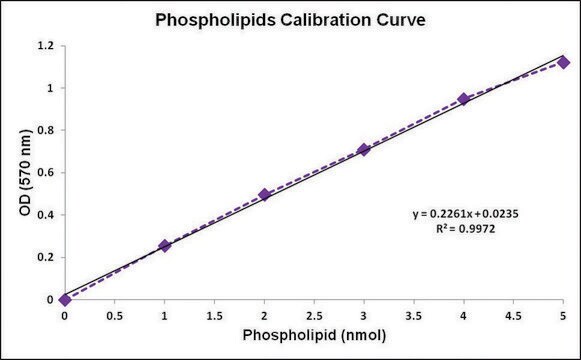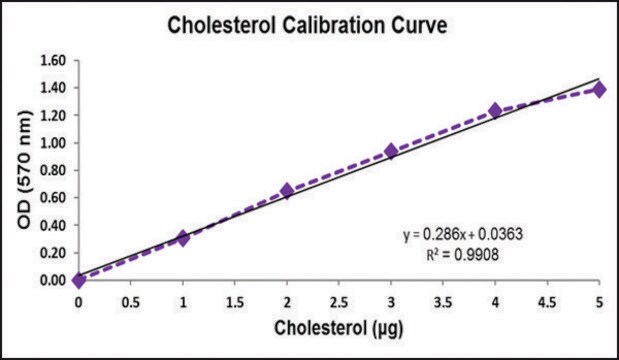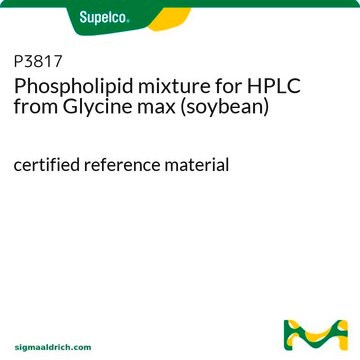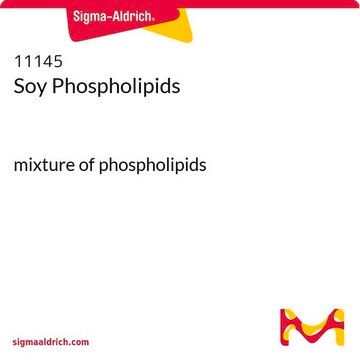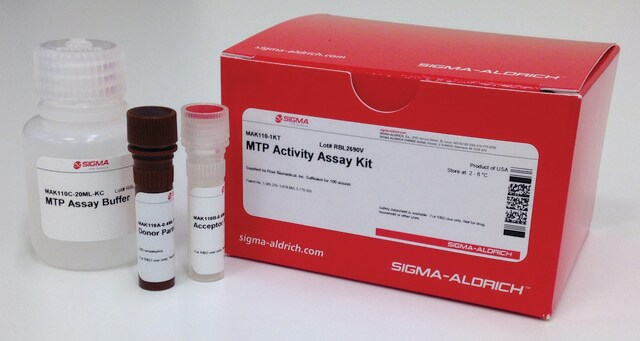MAK122
Phospholipid Assay Kit
sufficient for 100 colorimetric or fluorometric tests
Synonym(s):
Phospholipid Quantification Kit
Sign Into View Organizational & Contract Pricing
All Photos(1)
About This Item
UNSPSC Code:
12161503
NACRES:
NA.84
Recommended Products
usage
sufficient for 100 colorimetric or fluorometric tests
application(s)
cosmetics
food and beverages
pharmaceutical
detection method
colorimetric
fluorometric
shipped in
dry ice
storage temp.
−20°C
Related Categories
General description
Phospholipids are a class of lipids which constitute a major component of cell membranes and play important roles in signal transduction. Most phospholipids contain one diglyceride, a phosphate group, and one choline.
In this assay, phospholipids (such as lecithin, lysolecithin and sphingomyelin) are enzymatically hydrolyzed to choline which is determined using choline oxidase and a H2O2-specific dye. This results in a colorimetric (570 nm)/ fluorometric (λex = 530/λem = 585 nm) product directly proportional to the phospholipid concentration in the sample. The range of linear detection is 3 - 200 μM for colorimetric assays and 0.6 - 20 μM for fluorometric assays.
In this assay, phospholipids (such as lecithin, lysolecithin and sphingomyelin) are enzymatically hydrolyzed to choline which is determined using choline oxidase and a H2O2-specific dye. This results in a colorimetric (570 nm)/ fluorometric (λex = 530/λem = 585 nm) product directly proportional to the phospholipid concentration in the sample. The range of linear detection is 3 - 200 μM for colorimetric assays and 0.6 - 20 μM for fluorometric assays.
Application
Phospholipid assay kit has been used in biochemical analysis and phospholipid quantitation.
Features and Benefits
Compatible with high-throughput handling systems.
Suitability
Suitable for the detection of phospholipids in biological samples
Principle
In this assay, phospholipids (such as lecithin, lysolecithin and sphingomyelin) are enzymatically hydrolyzed to choline which is determined using choline oxidase and a H2O2-specific dye. This results in a colorimetric (570 nm)/ fluorometric (λex = 530/λem = 585 nm) product directly proportional to the phospholipid concentration in the sample. The range of linear detection is 3 - 200 μM for colorimetric assays and 0.6 - 20 μM for fluorometric assays.
Signal Word
Danger
Hazard Statements
Precautionary Statements
Hazard Classifications
Aquatic Chronic 3 - Resp. Sens. 1
Storage Class Code
10 - Combustible liquids
Certificates of Analysis (COA)
Search for Certificates of Analysis (COA) by entering the products Lot/Batch Number. Lot and Batch Numbers can be found on a product’s label following the words ‘Lot’ or ‘Batch’.
Already Own This Product?
Find documentation for the products that you have recently purchased in the Document Library.
Customers Also Viewed
Inhibiting mevalonate pathway enzymes increases stromal cell resilience to a cholesterol-dependent cytolysin.
Griffin S, et al.
Scientific Reports, 7(1), 17050-17050 (2017)
Vineela Parvathaneni et al.
Pharmaceutics, 12(3) (2020-03-04)
Non-small cell lung cancer (NSCLC) is a global disorder, treatment options for which remain limited with resistance development by cancer cells and off-target events being major roadblocks for current therapies. The discovery of new drug molecules remains time-consuming, expensive, and
Zhizhou Kuang et al.
Virulence, 11(1), 1090-1107 (2020-08-28)
The virulence behaviors of many Gram-negative bacterial pathogens are governed by quorum-sensing (QS), a hierarchical system of gene regulation that relies on population density by producing and detecting extracellular signaling molecules. Although extensively studied under in vitro conditions, adaptation of
Hypoxia-inducible factor-1 alpha as a therapeutic target for primary effusion lymphoma.
Shrestha P, et al.
PLoS Pathogens, 13(9), e1006628-e1006628 (2017)
Stephanie Chin et al.
Cells, 8(8) (2019-08-03)
The recent cryo-electron microscopy structures of zebrafish and the human cystic fibrosis transmembrane conductance regulator (CFTR) provided unprecedented insights into putative mechanisms underlying gating of its anion channel activity. Interestingly, despite predictions based on channel activity measurements in biological membranes
Our team of scientists has experience in all areas of research including Life Science, Material Science, Chemical Synthesis, Chromatography, Analytical and many others.
Contact Technical Service